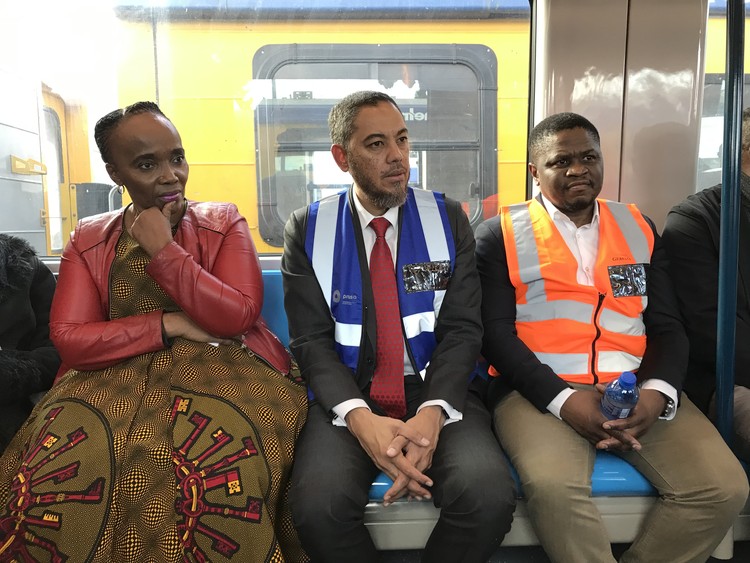
17 May 2023
On the train: Minister of Transport Sindisiwe Chikunga, PRASA chief executive Hishaam Emeran, and chief executive of Gibela Train Consortium Hector Danisa. Photo: Tariro Washinyira
Minister of Transport Sindisiwe Chikunga has rebuffed plans by the City of Cape Town to take over the passenger rail service in the city from the Passenger Rail Agency of South Africa (PRASA).
In an interview during an oversight visit and train ride from Bellville to Eerste River on Tuesday, Chikunga said devolution was in the rail policy. “But there are conditions to it.”
“For now we are not in the process of devolving railway services,” she said. “That is why PRASA is busy building railway services in the Western Cape.”
Chikunga was assessing work done on the Bellville to Eerste River section of the Northern Line. In January a limited service resumed between Eerste River and Bellville after years of no service. Regional engineering manager Raymond Maseko assured the minister trains would also run to Strand and Stellenbosch by October this year.
Chikunga said all PRASA wanted from the City was to move the people who moved onto the Central Line rail reserves after the line closed in October 2019. “That’s what we want from them, period.”
“The relocation and provision of houses is not PRASA’s mandate.”
Minister of Transport Sindisiwe Chikunga shakes hands with Metrorail spokesperson Zinobulali Mihi at Eerste River station. Photo: Tariro Washinyira
The City of Cape Town has said that preliminary financial analysis suggested an efficient passenger service would save lower-income households R921-million a year and sustain more than 51,000 jobs. “Our analysis shows there is an urgent need for the National Government to devolve Cape Town’s passenger rail for the City to run,” said Mayor Geordin Hill-Lewis in a statement in April. “We call on the President and new Transport Minister Sindisiwe Chikunga to ensure the immediate finalisation of the much-delayed National Rail Devolution Strategy so that the City can get the trains running in the interest of all residents,” said Hill-Lewis.
The provincial government is also in favour of shifting the responsibility for passenger rail. Western Cape Minister of Mobility Ricardo Mackenzie told GroundUp the devolution of passenger rail services is approved government policy, with the National Rail Policy White Paper gazetted in May 2022.
“In the meantime, we cannot sit around and wait. I have made it clear that, as the Western Cape Government, restoring rail services for our commuters is a top priority. We are working hard to support and intervene wherever possible to make sure that people can get to work and school with safe, reliable, affordable and sustainable mobility options.”
“While the devolution of rail is likely to be a complex and challenging process, we fully support the policy.”
Joseph Mayson, the Legal Officer of #UniteBehind, said it was clear that devolution would happen. “A national devolution plan is being developed by the Department of Transport, which it says will be complete in 2024. It is clear that devolution will happen, the only question is, “When?
“There has been progress on some lines in Cape Town and we welcome this. However, two-thirds of the Central Line is still out of service. Many trains are delayed and cancelled. Stations and the old, yellow trains are still unsafe. PRASA’s management and governance, on a national scale, is broken. Over the past decade, it has achieved an average of 21% of its own performance objectives. Last year, it achieved 12.5% of its objectives.
“Devolution to the lowest level of government possible is required in terms of the Constitution, legislation, and policy. It is best for local public transport, including trains, to be owned, managed and operated by the local government. As commuter rail in the Western Cape is almost exclusively within the City of Cape Town’s jurisdiction, we believe that PRASA’s commuter assets and operations should devolve to the City.”